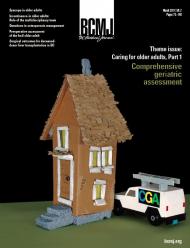
Dr. Roger Wong
Faculty and medical residents from UBC’s Faculty of Medicine recently teamed up, putting pen to paper to help promote senior care in British Columbia.
“It’s great to see our faculty and residents coming together to author articles designed to help practicing physicians who are caring for older adults across the province,” says Executive Associate Dean of Education, Dr. Roger Wong, a practicing geriatrician.
In March and April, the British Columbia Medical Journal (BCMJ) — which provides continuing medical education for physicians across B.C. — will feature the work of faculty and medical residents as part of a two-part series dedicated to the theme of aging and geriatrics.
Dr. Wong, who is serving as the guest editor of both issues, says that the publications will go a long way in helping physicians remain well informed on a wide range of issues facing B.C.’s aging population, which — according to Statistics Canada — is projected to exceed the national average over the next 25 years.
“As the population ages, B.C.’s doctors are continuing to see an increased number of complex cases — individuals faced with a number of medical, mobility and psychological issues,” says Dr. Wong, who previously served as the President of the Canadian Geriatrics Society. “Our faculty and residents in the field of geriatrics have a key role to play in helping to keep B.C. doctors abreast of emerging research and best practices in the field.”
March’s issue, now available online, explores the value of conducting comprehensive geriatric assessments (or CGAs). According to Dr. Wong, these assessments are critical when it comes to evaluating the complex needs of older adults in busy clinical settings.
“Comprehensive assessments have proven benefits for older people, including preservation of physical function, maintenance of community living status, and even shorter stays during hospitalization,” says Dr. Wong.
Next month, as part of the April issue of the BCMJ, faculty and medical residents are set to take a closer look at dementia, delirium, depression and drug-related programs in older people.
“We call these the four Ds in geriatrics,” says Dr. Wong, “They are poorly understood by the public and even among health practitioners, but they require timely identification and appropriate management.”
In an effort to help empower current physicians and healthcare providers supporting older people across B.C., April’s issue of the BCMJ will include a 12-tip guideline for assessing and managing cognitive impairment and dementia in older adults, as well as articles on diagnosing and managing late-life depression, recognizing delirium, and weighing the risks and benefits of reducing or discontinuing medication.
“It’s critical that the management of the four Ds is embedded in the training of physicians, both during and beyond medical school and residency,” says Dr. Wong. “We need to support physicians and all other health professionals so that they feel empowered and ready when working with older people.”
Explore the March issue: http://www.bcmj.org/issue/march-2017 or the April issue: http://www.bcmj.org/issue/april-2017
